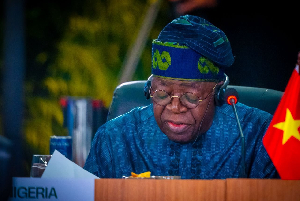When history looks back at Africa‘s economic awakening, November 10, 2025, may stand out as one of those quietly decisive days when ambition met architecture and rhetoric gave way to resolve.
In Abu Dhabi at the UAE–Chad Trade and Investment Forum, Oliver Alawuba, Group Managing Director and Chief Executive Officer of United Bank for Africa (UBA) Plc, delivered a keynote address that sounded like a rallying cry.
Under the theme “Financing African Competitiveness: Building Bridges, Powering Progress,” Alawuba outlined a compelling blueprint for how Africa can finance not just its dreams but its destiny.
“The era of potential is over. We are now in the era of execution,” he declared. The line drew a sharp boundary between the past and the future. It came across not as optimism but as intent from a banker who has spent decades proving that African capital can and should power African transformation.
At the centre of his message was Tchad Connexion 2030, Chad’s 30-billion-dollar development plan covering 268 projects across energy, water, infrastructure and human development. Alawuba praised it not merely as an economic plan but as a declaration of confidence and a move from the margins of global economics to its mainstream.
What elevated his address was the argument for a new financial architecture for Africa, one that mobilises local capital, leverages regional expertise and attracts global investment through credible structures. He proposed a three-part model built on international capital, African institutional banking and Development Finance Institutions, a framework that makes partnership both practical and profitable.
In Alawuba’s framing, African banks like UBA are no longer middlemen but “architects of finance.” He backed this up with examples. From the $400 million Julius Nyerere Hydropower Project in Tanzania to UBA’s $700 million investments in Nigeria’s power sector and $315 million in Ghana’s road infrastructure, he demonstrated that African banks are already financing transformation at scale.
In Chad, that commitment is personal and tangible. UBA has invested over $102 million in the nation’s securities, funded a $49 million domestic gas project, a $6.7 million wind farm in Amdjarass and key infrastructure in energy and telecoms. “We are here to be the bridge between vision and reality,” Alawuba said.
Beyond large projects, his emphasis on inclusion struck a chord. He reminded his audience that competitiveness is hollow without inclusion and that the road to Africa’s renaissance must pass through Beira, Nzerekore and Gulu, not only Lagos and Nairobi. By extending banking to the remotest corners, UBA ensures that the smallholder farmer and the local entrepreneur are as much a part of Africa’s competitiveness as the corporate boardroom.
Perhaps the most striking part of the address was Alawuba’s dismantling of the old myth that Africa lacks capital.
Citing data from the Africa Finance Corporation, he revealed that Africa holds about four trillion dollars in domestic financial assets, of which less than 15 percent is channeled into productive infrastructure.
“The challenge has never been a lack of capital but a lack of bankable structures and credible partnerships,” he said.
In that moment, the narrative shifted. Africa was no longer a continent waiting to be rescued; it was a market ready to be financed.
Alawuba also invoked a spirit of partnership rooted in history, quoting Sheikh Zayed bin Sultan Al Nahyan, the UAE’s founding father: “Our forefathers lived and survived in a difficult environment because they recognised the need to work together.” The echo was a deliberate call for Africans and their international partners to unite resources and resilience to build something lasting.
The UAE–Chad partnership, seen in this light, becomes a symbol of a new kind of cooperation, South–South, investment-driven and anchored in shared prosperity. For Chad, it is a leap toward transformation. For Africa, it is a glimpse of what is possible when vision meets viable financing.
Alawuba’s address was a manifesto for a new African confidence, one grounded in competence, collaboration and capital. It was a reminder that Africa’s growth story will not be written in aid memos but in balance sheets and infrastructure blueprints.
If Tchad Connexion 2030 is the blueprint and if leaders like Alawuba are the bridge, it is safe to say that Africa’s future is already under construction.
Business News of Sunday, 16 November 2025
Source: www.thenationonlineng.net













